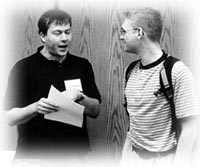Selected Haiku
by
Ryan Casey
Global Haiku Tradition
Millikin University, Spring 2000
|
• Ryan's project • See his essay on tanka. • Read his haibun. • |
Ryan Casey's starting realization: A few short months ago, I didn't know what haiku was. I really didn't. In grade school, I did the whole 5-7-5 nature poem. I wrote quite a few of them actually. I remember one specifically was about a waterfall. I can only imagine how horrible they actually are. My next experience was last semester at a reading from School's Out. After a lot of confused counting on my fingers-that's weird, I only counted two lines; and now I know that one was only twelve syllables long—I came to realize that I was clueless. I knew that I didn't know, which was more than I had known before. And basically, when I walked into class the first time this semester, I wasn't quite sure what to expect. Introduction In his recent collection, George Swede includes in his definition of haiku the ability "to generate a feeling of awe and wonder." My past two summers have been spent in the mountains of northern New Mexico—a place where the very terrain emanates a powerful sense of wonder and awe. My summers there are lived freedom—freedom of thought, freedom of exploration, freedom of emotion, and freedom of expression. If these same summers don't exist with a liberty of action, there is certainly no activity that my job requires that I'm unwilling to do, that doesn't lift me both intellectually and spiritually. The "real world" seems, at times, tediously monotonous when I return from the mountains. To encounter academic fields, where unconventionality is often frowned upon. To exist in a world where the natural world is kept at bay. To often feel that I have to struggle to lift up myself, let alone find those connections that allow me to bridge with other people. It's a difficulty switch to make, and leaves a hollow that e-mails to summer friends and reunions with a photo album can't fill up. When I discovered haiku in January, I discovered a genre of writing that could capture the sense of wonder I experienced during my summers. In the simple brevity, they could encapsulate my memories of the mountains. Upon the reflection they generated, I was able to remember the parts of my life in the "real world" that did provide me with a sense of wonderment. Namely, I recalled my Confirmation lessons about the Gifts of the Holy Spirit—the seventh of which was Fear or Wonder and Awe of the Lord. I also found the sense of self that will always keep me grounded to the Midwest in the form of my family. All in all, haiku—and later haibun and to an even greater extent, tanka —became that which bridged, for me, my summers and school year. In these, could coexist imagination, dreams, and reality. The bridge between my first summer in the mountains and my journey home was signified by an incredible vision—a crimson moon. Many of these poems bring me back to that same state—in between. Thanks so much to all the members of English 340—Global Haiku Traditions. Your criticism has been embraced, and your haiku an inspiration. And the deepest gratitude to Dr. Randy Brooks, who allowed it all to happen—self-discovery within a genre, freedom within tradition, and wonder and awe within the "real world." —Ryan Casey, 15 May 2000 |
|
faint human shadow 2nd place |
|
my mother's face |
|
first rain . . . |
|
spring morning— |
|
for hours, we talk, |
|
soup kitchen lunch— |
|
piano arpeggios— |
|
rain taps at the window— |
|
a crimson moon |
|
sun lingers |
|
royal gorge bridge— |
|
good friday— |
|
thunder distant now . . . |
©2001 Randy Brooks, Millikin University, Decatur, Illinois || all rights reserved for original authors
